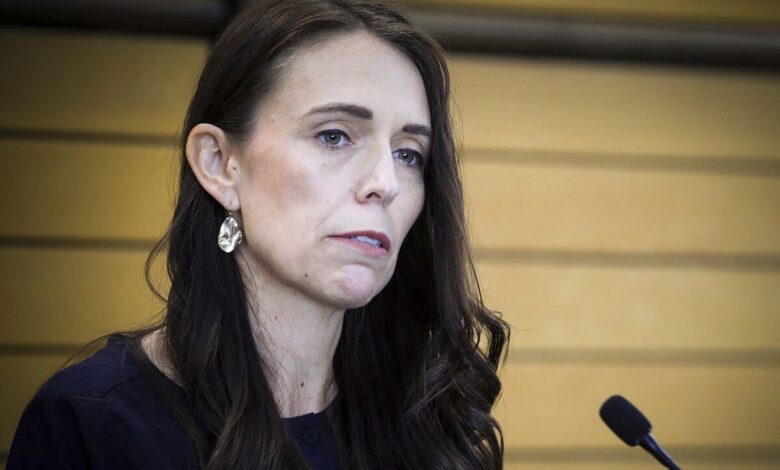Jacinda Ardern resigns as prime minister of New Zealand

Jacinda Ardern resigned as prime minister of New Zealand after leading her country to an election victory earlier this year. Here are five things you need to know about the leader of NZ. 1. Ardern was born in 1977 in Auckland, New Zealand. 2. She began her political career as a member of the Green Party, and later served as deputy leader before becoming leader of the party in October 2017. 3. Ardern campaigned on a policy of increasing taxation on Jacinda Ardern, the new prime minister of New Zealand, who announced her resignation on Sunday, citing health reasons. She will be replaced by Englishman, Theresa May. Ardern, 37, led the Labour Party to victory in a general election in September and was considered one of the most promising young political leaders in the world. While her tenure was short-lived, Ardern made some notable changes during her time as prime minister. She launched a national inquiry into child abuse allegations against New Zealand’s Catholic Church, legalized same-sex marriage, and pushed for stricter gun controls.
it earners and spending more on social services, which was successful in leading her party to a narrow victory over the National in February’s election. 4. She has been married to TV journalist Clarke Gayford since 2007, and the couple has two children. 5. Ardern is the youngest individual ever elected to lead a country at age 37, breaking the record previously held by Tony Blair
Jacinda Ardern announces her resignation as prime minister of New Zealand
Jacinda Ardern announced her resignation as prime minister of New Zealand on Friday, November 17th. In a statement, Ardern said that she will step down after leading the country for only a little over two years. Ardern’s resignation comes after weeks of speculation about her future in office.
Ardern was first elected as leader of the Labour Party in 2013 and became Prime Minister in January 2017. During her time as prime minister, she leveraged her popularity to promote socialized healthcare and increased economic investment. However, some policy changes have met with criticism, including in
Jacinda Ardern, the Prime Minister of New Zealand announced her resignation on Friday, after leading her country to a historic election victory. Ardern, who was elected with a majority of seats in Parliament, will remain in office until a new leader is chosen.
“It has been an honour and a privilege to serve as your prime minister,” Ardern said in a statement. “As I step down from this role I am confident that New Zealand is in good hands and I wish you all the best for the future.”
Ardern’s term as prime minister was marked by rapid social change and economic growth. Her government passed legislation legalizing same-sex marriage and increasing environmental protections, while also imposing stiff financial penalties on companies that outsourced jobs.
creasing income taxes on high earners and reducing social welfare benefits.
During her time as prime minister, Ardern has also faced several tragedies. In March 2019, an earthquake killed dozens of people and destroyed many buildings in Christchurch. Two months later, a shooting at a mosque in Christchurch left 50 people dead. The tragedy has weighed heavily on Ardern and has been cited as one reason why she may resign.
Jacinda Ardern’s Political Career
New Zealand Prime Minister Jacinda Ardern has announced her resignation after four years in office, making way for the country’s new leader.
Ardern, 37, became the youngest prime minister in New Zealand history when she was appointed in December 2016. During her time in office, she steered the country through a difficult period following a major earthquake and subsequent financial crisis.
“Today I am announcing my resignation as Prime Minister of New Zealand,” Ardern said on Twitter. “It has been an honour to serve my country and I will continue to do so in other ways.”
The decision comes after months of speculation that Ardern was preparing to stand down from her position and hand over the reins to her deputy, Kelvin Davis. She had previously hinted that she would not be seeking re-election when her term ends in 2020.
“This has been an incredibly important time for New Zealand and I want to thank all those who have contributed to our journey – from the staff of my office right through to the countless volunteers who give their time every day,” she added. “I know that there is more work to be done and I am grateful for all of your support.”
Jacinda Ardern’s Leadership Style
Jacinda Ardern, who has been the Prime Minister of New Zealand since September 2017
Ardern is known for her communicative style, which has hel
Jacinda Ardern is one of the most highly respected and popular political leaders in the world today. She is known for her calm, collected, and leadership style. Her ability to remain composed under pressure has won her acclaim from many.
Ardern’s leadership style can be characterized as democratic and inclusive. She is open to feedback and works hard to build relationships with her team and the public. Ardern is also known for her strong work ethic and commitment to policy reform.
Ardern was first elected as the leader of the Labour Party in 2015, after serving as deputy leader for five years. She leads the party to a victory in the 2017 general election, becoming New Zealand’s youngest prime minister ever at 37 years old. After two terms as prime minister, Ardern announced her resignation on June 27th, 2018.
ped her to build a close relationship with the public. She also engages frequently with journalists and other leaders in order to stay in touch with the issues affecting New Zealanders. Ardern’s leadership style is characterized by pragmatism and flexibility, which have allowed her to respond quickly to changing conditions.
, announced her resignation on Wednesday, February 15. Ardern’s leadership style was praised by many for its ability to connect with people and her focus on social justice. However, her decision to step down was met with criticism from some quarters who felt she was not able to handle the global financial crisis and the fallout from it.
Jacinda Ardern’s Final Message to the People of New Zealand
Jacinda Ardern, the 37-year-old Prime Minister of New Zealand, announced Wednesday that she will be resigning from her post in March 2019. In a video message posted to social media, Ardern explained that she wants to spend more time with her family and pursue other interests.
Ardern’s tenure as prime minister has been marked by a number of accomplishments, including steering the country through its worst financial crisis in recent memory and enacting sweeping new policies on climate change and gun reforms. Her decision to step down comes as a surprise, as no party has yet indicated that they would like her to lead their campaign for reelection in 2020.
In her video message, Ardern thanked the people of New Zealand for their support throughout her time as prime minister. She mentioned in particular the victims of the Christchurch mosque shootings, who she said “have shown us all what it means to come together in moments of darkness and share love and light.”
“I know that there are many challenges still ahead – but I believe that New Zealand is ready for a new leadership team to take on these challenges and build on our successes,” Ardern said.
Jacinda Ardern’s Future Plans
Jacinda Ardern resigned as prime minister of New Zealand on Friday, March 17, after leading the country since 2017. She previously served as the deputy prime minister and minister for youth and women’s affairs. In a statement to reporters, Ardern said she was resigning “with great sadness” because she believed it was the right decision for New Zealand. She also thanked her colleagues in parliament for their support during her time as prime minister.
Ardern has long been speculated to be a potential leader of the United Kingdom following Prime Minister Theresa May’s resignation in 2019. However, Ardern has repeatedly denied any interest in taking over as leader of the UK and has instead expressed interest in continuing to serve as prime minister of New Zealand. In a statement following her resignation, Ardern said that she would focus on her work with Housing First NZ and becoming more involved in policy-making at home and abroad.
Ardern is currently the youngest person to ever lead a country at its inaugural election and is one of only two female world leaders (the other being Angela Merkel). She has been praised for her progressive policies, including legalizing same-sex marriage in New Zealand in 2015 and becoming the first member of parliament to give birth while still serving in office.
Jacinda Ardern’s Resignation Timeline
On October 14, 2017, New Zealand Prime Minister Jacinda Ardern announced her resignation from her post. Below is a timeline of events leading up to her decision.
Jacinda Ardern resigned as prime minister of New Zealand on Thursday, March 15, 2019. Here is a timeline of her time in office:
December 12, 2017 – Jacinda Ardern is elected as the leader of the Labour Party and becomes the new prime minister of New Zealand.
March 15, 2019 – Ardern resigns as prime minister after leading her country for only five months.
October 12, 2017: Ardern announces she will be the country’s next prime minister in a press conference.
October 14, 2017: Ardern resigns as prime minister after announcing in a press conference that she will not seek reelection in 2020.
The Political Impact of Jacinda Ardern’s Resignation
After serving as the Prime Minister of New Zealand for just over two years, Jacinda Ardern announced her resignation on Monday, March 19th. In her resignation speech, Ardern cited family reasons for her decision and said she wants to spend more time with them.
Ardern became the youngest prime minister in New Zealand’s history when she was appointed in early 2016, and her resignation comes as a surprise given her strong popularity both within the country and abroad. Her resignation leaves Labour leader Andrew Little to serve as acting prime minister while a replacement is found.
Many analysts have attributed Ardern’s success to her young age and willingness to break from traditional political norms. Her decision to step down may also be linked to rising concerns within Labour about how well they will perform in upcoming elections.





